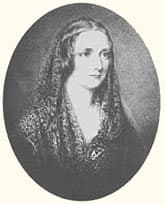Mary Shelley
Critique

Born
1797
Died
1851
Publications
Novels
Writing languages
English
Literature
• Frankenstein (1818)
Novels
• Frankenstein (1818)
British Literature
• Frankenstein (1818)
Science Fiction
• Frankenstein (1818)
On a dark and stormy night
The story goes that famed poet Lord Byron, his physician John Polidori, rising young poet Percy Bysshe Shelley and Shelley's wife, Mary, were on vacation at Lake Geneva during a rainy season which left them stranded inside a chalet. They entertained themselves with ghost stories and Byron proposed that to pass the time they each write such a story themselves. It was mainly a competition between the two acknowledged poetic geniuses, but those two soon gave up the notion of writing prose fiction. However, as a result of the game, Polidori became renowned as the creator of The Vampyre, the forerunner of modern bloodsucking tales—and Mary produced the horror classic, Frankenstein, or the modern Prometheus (1818).
In the years immediately after writing Frankenstein, her own life became rather horrible as two of her three children died, she had a miscarriage, she suffered a nervous breakdown, and then Percy dies accidentally. Although she'd always expected to be the support of her husband's brilliant literary career, she was forced by circumstances to become a professional writer herself to support her remaining son.
Romantic journal
Her life was itself a story of great romance and tragedy. She'd been born to prominent intellectuals, the philosopher William Godwin and Mary Wollstonecraft, author of A Vindication of the Rights of Woman which became a seminal feminist tome. Her mother died shortly after her birth.
In her father's intellectual circles Mary met such luminaries as Coleridge and Shelley. At age 16 she fell in love with the already married Shelley. They eloped to Switzerland where they lived together for two years, despite her father disowning her, until the death of Shelley's wife Harriet in 1816 opened the way to marriage. Together Mary and Percy wrote Journal of a Six Weeks' Tour (1817) about their experiences.
After Frankenstein, the Shelleys moved to Italy and in 1822, at the age of thirty, Percy drowned in the bay near Livorno.
Mary produced many short stories and several more novels, including the romance Valperga (1923) and The Last Man (1826), a work of speculative fiction which has gained recognition recently for its depiction of a future catastrophe and its indictment of patriarchy.
Much of her writing though continued to involve her late husband, as Lodore (1835) and Falker (1837) are sometimes considered fictional defences of his work against critics. She also edited collections of his poetry and other writings, and she started on his biography which she eventually abandoned. She published a popular travelogue Rambles in Germany and Italy in 1844.
Yet Frankenstein remains, by far, her most popular work. Thirty-seven films, and counting, have been based on her novel or featured its characters.
— Eric
Critique

